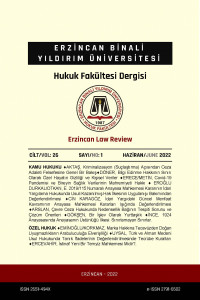Research Articles
Issue Editorial Board

Aim & Scope
Erzincan Law Review (ErLR) aims to contribute to the national and international literature by publishing original and qualified scientific works in the field of law and the other scientific fields, which are related to the law.
Erzincan Law Review (ErLR) consists of original scientific studies, such as law and law-related interdisciplinary articles, decision reviews, legislative evaluations, book reviews and translations, which are submitted by academics, researchers and practitioners.
Author Guidelines
Publication Principles
1. Law Journal of the Faculty of Law of Erzincan Binali Yıldırım University (EBYU-JoL) is a scientific, peer-reviewed and national journal.
2. The publication language of the journal is Turkish, English, German and French.
3. 3. The journal is published twice a year, in June and December. The latest deadline for submission of the June issues of the Journal is at 31st of April; and the latest deadline for submission of the December issue is at 31st of October. The studies submitted after these dates will be contained in the publication evaluation list for the next issue.
4. Studies submitted to the Journal should be related to the public law, private law or economy-finance fields and should not been published in any other Journals or sent for the publication. Any works that have been sent to the Journal will be accepted as the commitment of the author on this matter.
5. The Journal contains studies, such as article, case analysis, translation, evaluation of legal rules and book criticism. Whether all these submitted studies will be published or not is decided by the Editorial Board. A copy of the translations in the original language should be sent. In translations, it is also essential to get a writing permission from the rights holders on the original work in accordance with the Intellectual Property Law for the translating authors.
6. The papers should be sent to the e-mail address of the Journal (dergihukuk@erzincan.edu.tr) as the Microsoft Word format and should be prepared in accordance with the writing rules of the Journal. The submitted paper should not contain any statement that would identify the author. In the e-mail the author should indicate his/her name, academic title (if any), the ORCID number, the institution he/she works for, contact details, telephone number and e-mail address. In addition, one hard copy of the papers that is sent to the postal address of the Erzincan Binali Yıldırım University Law Faculty (Erzincan Binali Yıldırım Üniversitesi Hukuk Fakültesi Dekanlığı, Mimar Sinan Mah. 24070 Merkez/Erzincan) is acceptable too.
7. In the submitted papers only the name of the author should be included under the title of the work on the first page. Academic title, the university, the faculty and department, ORCID number and the official e-mail address should be indicated respectively in the footnote that should be created with the (*) symbol next to the name.
8. The first examination of the papers will be completed by the Editor and then submitted to the Editorial Board. If the result of the plagiarism report exceeds the rate determined by the Editorial Board; if there are unusual and major spelling and writing mistakes; if the submitted study is non-compliance with the scientific criteria; if it is determined that the work does not match with the publication principles, the submitted study will be rejected by the Editorial Board. The final discretion about the publication of the submitted works belongs to the Editorial Board of the Journal.
9. In accordance with “the objective evaluation principle”, after the initial examination of the submitted works that is completed by the Editor, all of the studies are submitted to the review of at least two referees in the relevant interested areas, who have a higher academic degree than the author. The authors are not informed about the peer-reviewed process. The studies to be published in the journal are subject to the double blind refereeing. According to the referees report, the submitted works can be published or can have minor/major corrections or can be rejected. The authors are informed as soon as possible about the referees report.
10. If one of the reports from the referees is negative and the other is positive, the Editorial Board has a discretion on whether to send it to a third referee or not. The study shall not be published if the third referee report is also negative. In case the referees request corrections in their reports, the author cannot make any substantial changes other than the corrections that are specified by the referees. After these corrections are completed by the author, peer review can be applied again in accordance with the recommendations of the referees. Unpublished works shall not be sent back to the authors.
11. Papers, the peer review process of which are not completed within the time limit, may be published in the next issue of the Journal, unless the work is not withdrawn by the author.
12. If the papers are accepted for the publication, Erzincan Binali Yıldırım University Faculty of Law will have all copyrights on the submitted works including publishing them as full text in any format. It is deemed to be accepted by the authors that no royalties will be paid.
13. Responsibilities for the views and opinions in the published studies of the Journal belong to the author or authors.
Citation and Writing Rules
1. The manuscripts to be submitted should be in Times New Roman, 1.5 lines spacing of the main text and 12-type size. Footnotes should be prepared in 10-font size and the work should not be exceed 50 pages (this number of pages is valid for the specified format, it may increase after the layout). Footnotes should be indicated at the bottom of the page. Footnote text should be justified and written with 3 pt spacing. At the end of the work, there should be a bibliography, where all the sources used in the study are listed according to the surnames of the authors.
2. In the studies submitted to the Journal, both Turkish and English titles, abstracts consisting of at least 100 and maximum 200 words, and key words consisting of at least 5 and maximum 10 words must be indicated.
3. The text should be written as justified on both sides. Automatic titles of Microsoft Word should not be applied in the studies. Direct or abbreviated quotations should be italics and indicated in quotation marks. One character space should be left after all punctuation marks.
4. In the first time using of abbreviations for the name or title, the abbreviations should be specified in parentheses after the original word.
5. The introduction, conclusion and bibliography should be written in bold and with the all capital letters without numbering.
Ethical Principles and Publication Policy
The Scientific Research and Publication Ethics Directive of the Council of Higher Education and the International Standards for Editors and Authors of Committee on Publication Ethics should be considered in the scientific studies submitted to the ErLR. In this respect, the Journal assures upon to comply with the above-mentioned national and international rules regarding the “Publication Ethics, Research Ethics and Obtaining Legal/Special Permission”. In accordance with Article 8 of the Scientific Research and Publication Ethics Directive of the Council of Higher Education, acts against scientific research and publication ethics are as follows:
a) Plagiarism: Presenting the ideas, methods, data, practices, writings, figures or works of others as fully or partly their own work, without giving any references in accordance with scientific rules.
b) Forgery: To produce the data that is not based on any research, to edit or change the presented or published work based on untrue data, to report or publish them, to present an unfinished research as if it has been complete.
c) Distortion: To forge research records and obtained data; to present methods, devices and materials that are not used in the research as if they have been used; to contain the data that are not suitable for the research hypothesis; to manipulate the data and/or results in order to fit the relevant theory or assumptions; to forge or shape research results in their own interests.
ç) Republishing: To indicate more than one work containing the same results of a research as if all of them are separate works in associate professor examination evaluations or in academic promotions.
d) Slicing (Salami-Slicing): Publishing parts of a study in multiple papers instead of providing the full story in a single paper and applying with these multiple papers to the academic promotion by dividing the results of a research in a way that violates the integrity of the research.
e) Unfair authorship: Including people who do not have any contributions in the work; not including those who contribute actively among the authors, inappropriately changing the order of authors without any justification, removing the names of those who contributed actively from the work at the time of publication or in subsequent editions; to include his name among the authors by abusing his/her official influence.
f) Other Types of Ethical Violations: Not giving any references about the supporting institutions, organizations or contributors in the publication of a supported research; not abiding by the ethical rules in research on humans or animals; not respecting the rights of patients in the publications; to share information about the submitted study before it is published as an assigned referee on this submitted study; to misuse the resources, places, facilities and devices provided or reserved for a scientific research; to make intentionally a false, baseless, groundless ethical violation accusation against somebody.
Price Policy
All expenses of the journal are covered by the Erzincan Binali Yıldırım University. The publication process of articles and other works in the journal is free of charge. No processing fee or submission fee is charged for works submitted to the journal or accepted for publication.


